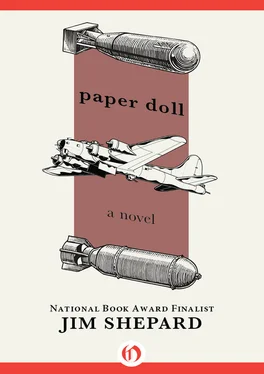Despite the radio silence imposed on him, Eddy was the first to call in the larger formation of Fortresses, turning like slow birds off to the north at an unexpectedly high altitude. They climbed to rendezvous, and in a group slipped into their position as lead low squadron.
There was something matter-of-fact about the spectacle, having to do with the bland impossibility of the sheer numbers of planes. Above and behind him B-17’s extended into the sky with the dazzling and fraudulent abundance of replicating images in facing mirrors.
He could see Bean amidships peering upward out of the radio operator’s oval window. Bean saw him and waved and pointed. He realized with awe that the bomber stream extended farther back than they could see.
“I guess the theory is, the Germans just don’t have this many cannon shells,” Lewis said finally, from the tail.
Bryant adjusted his mask and thought again, unhappily, about the brevity of his training — who was to replace who as formations of this size got thinned out or broke down? Did anybody really know? — and swiveled his turret to face forward. His mask was wet. His toes were ominously cold. It was August. In September of the previous year he had first set foot in an airplane of any kind.
He swayed on his sling, squeezing his oxygen hose every so often as a hedge against ice buildup. He felt the cold through the sheepskin and felt the hollowness and fragility of the airplane carrying them. He thought of Lewis, whispering to Snowberry during the night in an effort to calm him, the words frightening Bryant, at least, still more. All we have is that thin metal can. We can’t run and we can’t hide. We just do our job and do right by our buddies and tighten up our ass and pull our knees in and hope for the best.
The leading aircraft of the 231-plane formation left the English coast at a little promontory of Suffolk that Hirsch identified in passing as Orford Ness. Snowberry repeated the name with distaste from the ball turret below and then was silent. They were over water at 1:17, just about two hours after takeoff. Hirsch called it in. Bryant thought of Stormy with all those watches. They left landfall at 14,000 feet and climbing, in a bomber stream sixty miles long and drawing closer together. The sea crossing was scheduled to take thirty-five minutes.
“Where’s Der Bingle?” Lewis asked about halfway across. “Don’t we get Der Bingle anymore?”
There was no answer from the ball.
“Oxygen check,” Cooper said. “Ball turret?”
“Ball turret,” Snowberry said. “Okay.”
Cooper reeled through the others, Bryant included. They rode on grimly. Bryant switched off his interphone and sang to himself. Around him the force was closing up. He could see the smoke and the shuddering from the planes to his right as they tested their guns. The racketing started on their ship and he shook in his sling when the ball and waist guns let go. He charged and cleared his own, aimed off into space, and squeezed the triggers, the roar shaking him and the tracer lines corkscrewing down and away. The waist and tail were firing, he could feel. Eddy and Hirsch up front on their single fifties. He smelled the cordite through the mask, the pungency tainting the cool oxygen. Fireworks. He flashed back on cans blowing into the air, cats shocked by porch to porch lobs. The smaller smoke bursts from the other planes’ guns trailed backward as lesser echoes of the enlarging contrail streams, all of the lines unfurling behind, striating the sky. The sight gave him the proud and uneasy sense that the whole attack, the whole formation, was indifferent to stealth or surprise, and was serenely intended to overwhelm the air defenses that lay ahead.
In their shallow elements of three the wingmen floated slightly above and behind their element leaders, trying to keep wingtips level with the leader’s waist gun positions. Paper Doll was an element leader, flanked by No Way and Archangel. Above them in a vee were Geezil II, Leave Me Home , and Dog Star. Immediately behind them were Quarterback, Lucky Me! , and Boom Town. Plum Seed flew between them as a loose egg, a spare. Element leaders maintained formation by keeping watch on squadron leaders, squadron leaders on group leaders, group leaders on combat wing leaders. There was, Bryant assumed, an extensive chain of succession worked out, in the event of what the CO called unexpected visits with the Glass Mountain.
Gabriel was correcting their course with the most discreet calibrations, the adjustments rippling through the following planes. He was flying well, and Bryant appreciated it. If the lead planes flew erratically, they forced a constant seesawing of position, with the ships sliding and sideslipping to hold their distances, which exhausted pilots and gave everyone else shortened breath, as well as shaking out the formation into a pattern too loose for adequate defense.
They did their share of weaving, but Bryant imagined the strain on Cooper and Gabriel, hauling their heavy plane around for hours with their hands and feet, and marveled at their endurance and ability. No Way and Archangel stuck right to them. Everyone was good. They were going to get through this.
They began the serious looking, for their escorts, for interceptors. Bryant divided the sky into eighths and searched each with something he hoped was methodical precision from horizon to azimuth. A scratch on the Plexiglas between the guns kept him occupied for minutes. His eyes hurt and rebelled at focusing and refocusing on nothing and his concentration waned and returned.
They turned a few degrees and he permitted himself a look down, at blue waves, the threads of whitecaps, a tiny boat. Eddy called out the Dutch coast landfall ahead and through the haze of the distance the edged pale green emerged, resolving itself as they drummed nearer into three large islands near wide river estuaries gleaming in the sun. He saw drifting motes which had to be shipping. One of the islands reminded him of Florida.
“Fighters, fighters, fighters,” someone shouted. It was Piacenti.
“Escort,” Lewis said. “Escort, sir. Three o’clock low.”
“Jesus,” Gabriel said. “Piacenti, you know?”
“Sorry, sir,” Piacenti said.
A group of them swept by in two diamond formations, green and brown Spitfires with their red, white, and blue rondelles flashing underwing. The crew cheered. They waggled their wings as they passed and climbed up and away from them, seeking altitude and a station well ahead of the bomber stream. The American P-47’s remained closer when escorting. The Brits believed it more useful to break up attacking German formations at a greater distance. The crews liked to see fighters nearby, and preferred the American strategy.
“Fighters! Fighters!” Eddy called, but Bryant could see nothing. A moment later a Spitfire flashed back past them, chasing something.
“Something’s wrong with No Way! ” Piacenti called. “They got fire in the number two and three—”
Right beside him No Way was battered and smashed across its cockpit, the windshield shattered and the two inboard engines feathered and flaming. The co-pilot climbed out his window while Bryant watched, a guy named Pease who Bryant remembered hated the powdered eggs, and he waved his arms in the slipstream as if to deflect it. He let go and hit the horizontal stabilizer on the tail, and tumbled away.
“Jesus God,” Gabriel said. “What happened? Anybody see it?”
No Way nosed smoothly up with the inboards still flaming and then sideslipped like a leaf and turned over. They could see the tail gunner trying to get out and through the smoke he did, the chute blooming open. The gunners started calling together, a chant, get out, get out, get out, and while they watched two waist gunners and someone else cleared. A wing separated at the root near the fire and trailed away, easy as a veil, and it began spiraling. Bryant lost it as it fell away behind them. Lewis and Snowberry called out another chute. When they banked he picked No Way up again, fluttering toward some rolling hills. A slope rose to meet it and it exploded, the thousands of pieces filling the air like silver dust.
Читать дальше












